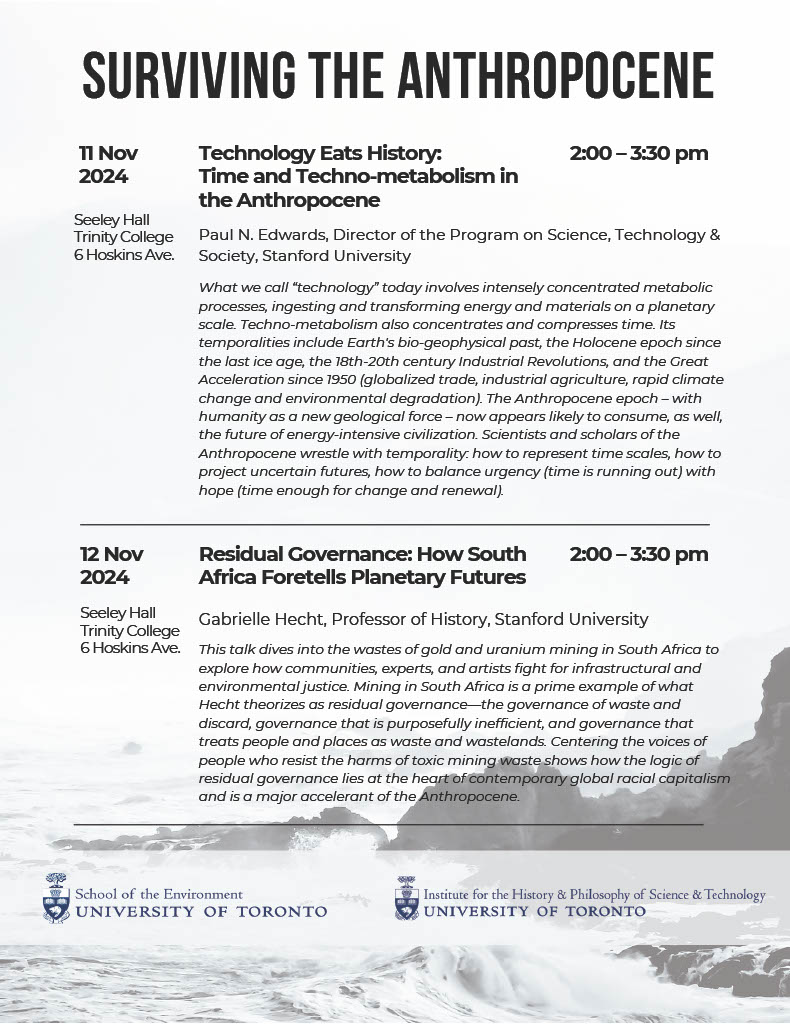Surviving the Anthropocene
When and Where
Speakers
Description
Join the School of the Environment and Institute for the History and Philosophy of Science and Technology on Monday, November 11th, 2024 and Tuesday, November 12th, 2024 to hear from two exceptional speakers from Stanford University, Paul N. Edwards and Gabrielle Hecht.
A reception will follow the final talk on Tuesday, November 12th, 2024 in the Junior Common Room at Massey College (4 Devonshire Pl, Toronto, ON M5S 2E1).
Registration is open! Please RSVP below.
Event Agenda
| Date | Time | Item | Speaker | Location |
|---|---|---|---|---|
| Monday, November 11th, 2024 | 2:00 PM - 3:30 PM | Technology Eats History: Time and Techno-metabolism in the Anthropocene | Paul N. Edwards | Seeley Hall, Trinity College (6 Hoskin Ave, Toronto, ON M5S 1H8) |
| Tuesday, November 12th, 2024 | 2:00 PM - 3:30 PM | Residual Governance How South Africa Foretells Planetary Futures | Gabrielle Hecht |
Seeley Hall, Trinity College (6 Hoskin Ave, Toronto, ON M5S 1H8) |
| Tuesday, November 12th, 2024 | 4:00 PM - 5:30 PM | Reception | N/A | Junior Common Room, Massey College (4 Devonshire Pl, Toronto, ON M5S 2E1) |
Speaker Details
Paul Edwards
About the Speaker
Paul N. Edwards is Director of the Program on Science, Technology & Society at Stanford University (where he also co-directs the Stanford Existential Risks Initiative), and Professor of Information and History(Emeritus) at the University of Michigan. He is the author of A Vast Machine: Computer Models, Climate Data, and the Politics of Global Warming (MIT Press, 2010) and co-editor of Changing the Atmosphere: Expert Knowledge and Environmental Governance (MIT Press, 2001), as well as numerous articles and other books. With Janet Vertesi, he co-edits a book series, Infrastructures, for MIT Press. Edwards recently served as a Lead Author for the Sixth Assessment Report of the Intergovernmental Panel on Climate Change (2021).
About the Seminar
Title: Technology Eats History: Time and Techno-metabolism in the Anthropocene
What we call “technology” today involves intensely concentrated metabolic processes, ingesting and transforming energy and materials on a planetary scale. Techno-metabolism also concentrates and compresses time. Its temporalities include Earth's bio-geophysical past, the Holocene epoch since the last ice age, the 18th-20th century Industrial Revolutions, and the Great Acceleration since 1950 (globalized trade, industrial agriculture, rapid climate change and environmental degradation). The Anthropocene epoch – with humanity as a new geological force – now appears likely to consume, as well, the future of energy-intensive civilization. Scientists and scholars of the Anthropocene wrestle with temporality: how to represent time scales, how to project uncertain futures, how to balance urgency (time is running out) with hope (time enough for change and renewal). As for political life, fractures have grown for decades between the slow temporality of deliberative institutions and the frantic pace of technological change. Holding multiple temporal and spatial scales within our analytic frameworks has proven difficult for STS, History of Technology, and the larger discipline of History itself. This talk points toward ways to reconfigure our conceptual and methodological tools to meet this urgent challenge.
Gabrielle Hecht
About the Speaker
Gabrielle Hecht is Professor of History at Stanford University. She is the author of Being Nuclear: Africans and the Global Uranium Trade, which received the Martin Klein Prize in African history and was shortlisted for the African Studies Association’s Herskovits Prize, and The Radiance of France: Nuclear Power and National Identity after World War II. She is also editor of Entangled Geographies: Empire and Technopolitics in the Global Cold War.
About the Seminar
Title: Residual Governance: How South Africa Foretells Planetary Futures
This talk dives into the wastes of gold and uranium mining in South Africa to explore how communities, experts, and artists fight for infrastructural and environmental justice. Mining in South Africa is a prime example of what Hecht theorizes as residual governance—the governance of waste and discard, governance that is purposefully inefficient, and governance that treats people and places as waste and wastelands. Centering the voices of people who resist the harms of toxic mining waste shows how the logic of residual governance lies at the heart of contemporary global racial capitalism and is a major accelerant of the Anthropocene.
Event Poster



